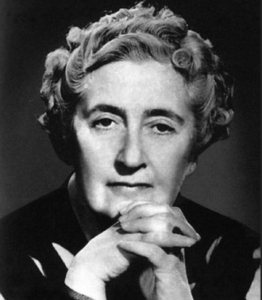One frosty December day in the late 1990s, Emmy Johnson, a new town transplant perused the shelves of Evergreen Hollow’s ancient library. As the town's heartbeat, this old New England library was a haven for book lovers, and a treasure trove of stories waiting to be discovered, especially as a warm escape from falling snow.
Emmy had taken a librarian job in this small, quiet town, far from the city, to focus on writing her first novel. Steeped in history, the cobblestone streets and historic buildings whispered tales of generations past that Emmy immersed herself within for inspiration.
This Monday morning, Emmy was walking the dusty aisles, and came across a collection of stories by Agatha Christie. There was one book of Miss Marple stories with a worn, tattered cover, that intrigued her. After pulling it off the shelf, she gingerly turned the yellowed pages and noticed something peeking out of the middle of the book. It was a folded letter tucked into the chapter titled, “The Christmas Tragedy.”
 After unfolding the mysterious piece of paper, Emmy found it was dated December 31, 1945. The writing contained notes about an unsolved murder in the town that had happened on Christmas Eve. To her amazement, Emmy noticed it was signed “Agatha.” Could it really be “the” Agatha?
After unfolding the mysterious piece of paper, Emmy found it was dated December 31, 1945. The writing contained notes about an unsolved murder in the town that had happened on Christmas Eve. To her amazement, Emmy noticed it was signed “Agatha.” Could it really be “the” Agatha?
Being new in town and not yet 30, Emmy decided to seek out locals to ask about the possible cold case. Fortunately, she had noticed three older women who just arrived for their weekly meeting every Monday in one of the library’s rooms.
“Sorry to interrupt. I’m Emmy Johnson, and new to town. I wondered if you’re all locals?” The three women turned and looked at the young woman expectantly. Emmy rushed to continue, “I found a letter in one of the old Agatha Christie books and have some questions.”
The older women shifted in their chairs and introduced themselves. First, Barbara “Barb” Hinske, was a retired lawyer and novelist. Next, Rita Toma was a former travel writer who turned cozy mystery author. And the third was Laurie Fagen, a renowned local entertainer that had enjoyed success as a historical fiction writer.
Laurie spoke up and patted a chair, “Sure sweetie, come sit with us.”
Emmy hurried over and took a seat, dropping the book in front of her.
Barb pushed her glasses up on her nose, reached for the book, and flipped it open. “Interesting, it’s a first edition printed in 1930,” she said and added, “Wonder how this was just on a shelf and not in the historical collection. It has to be worth a fortune.”
“Always the lawyer, but you make a good point. Why hadn’t anyone put it behind a protective case?” Rita asked.
“Let’s take a look at that letter you found,” Laurie added.
With a nod, Emmy cleared her throat and unfolded the letter ever so gently. The three older women leaned over the table to get a glimpse of the enigmatic letter. Emmy read the letter and then sat back to gauge their reactions.
To Whom It May Concern
In a recent visit to America, my attention was drawn to an unsolved murder in the town of Evergreen Hollow in Massachusetts. Because my visit was brief, this letter captured my thoughts of the events surrounding the murder and will lead the reader to the killer.
There are several facts about the case that began my ruminations.
1. The year was 1945 when a man, Junior Davidson, was found murdered sitting on a park bench in the center of town in the middle of winter. He was not wearing his boots.
2. As a soldier having returned from the European theater of World War II. While saved from dying in battle, here he was with a bullet in his heart.
3. He was married to his high school sweetheart in 1941 but left to join the Army Air Corps within two weeks after the wedding. It was rumored she had a dalliance with a local barkeep while he served, and Junior was very angry.
4. It was noted in a newspaper article about Junior’s return that he showed off a German pistol he had brought home.
5. Several people commented on hearing sleigh bells before his body was found.
I happened to have brought a copy of my first Miss Marple story with me to America and left it on the shelf for a curious reader to find.
The first clue is the name of the story, A Christmas Tragedy, where you found this letter tucked inside. The second clue is the lack of boots. (He could not have been out for a walk with no boots in winter, so he was killed and brought to the park bench.) And, finally, the last person to see him alive was a young cleric who gave an eyewitness account of the young soldier walking down Main Street and encountering his wife coming out of the church. He, the cleric, had been coming back from visiting a dying parishioner a few blocks away, so claimed he didn’t hear their exchange of words. He did notice the soldier push his wife out of his path and headed away to the front door of the church.
Was the young soldier murdered in the church and carried out to the park bench? But why no shoes?
Sadly, the case went cold, and I was not able to stay long enough to find evidence to bring the culprit to justice.
It is now in your hands,
Agatha
Laurie let out a low whistle, “Having lived here most of my life, I remember hearing about a famous author visiting town in the 40’s, but no details. It could have been her.”
“So, if this letter is legit, Christie was in town just after the murder and became convinced the death was an unsolved murder,” Emmy said.
Laurie laughed, “Yes, and girls, are we in? Shall we help this young lady?”
Barb and Rita looked at her, then at Emmy with a chorus of “YES!”
“Let’s divvy up the clues in the letter and meet back here later today to gather our findings,” offered Barb.
“If the murder happened on Christmas Eve, how great if we could solve it before then,” added Rita as she ran a hand through her short dark hair.
Laurie nodded in agreement and said, “Being over fifty years ago, it may be hard for us to find answers. With our brain trust, let’s work some magic!”
“That’s what I love about you, Laurie, your enthusiasm,” laughed Barb. “Emmy, since you work here at the library, can you take breaks to meet with us?”
Emmy stood up and smiled. “Yes, I’ll go make copies of the letter for each of you.”
When she returned and handed out the copies, silence fell as the women reviewed the letter. Rita was the first to speak. “Well, I can go look through the old newspaper archives to find the stories about the young man’s death.”
“Perfect, I’ll head over to the old folks’ home and ask around for anyone who knew the victim or possibly witnessed the scene,” Laurie said.
Jotting down some notes, Barb announced she would head over to the police department to see if they would still have the old reports on the event. “Interesting that Agatha determined there had been a murder, particularly when she was just visiting for a short time.”
All four women agreed to meet back at the library by 5 o’clock. “The good news is the library doesn’t close until 7 o’clock, so we’ll have a couple hours to discuss what we found,” Emmy said.
Back in her chair at the reference desk, Emmy helped the few patrons that came in then turned to the microfiche reader to hunt for newspapers from the 1940s to find news stories about the death. There was a reference to Junior Davidson’s obituary which was brief and spoke mostly of his military service. Emmy was surprised his wife’s name was not mentioned.
“Isn’t a shot in the heart most likely a man’s method of murder versus women using poisons?” Emmy mused to herself. “So, who would want the war hero dead?”
Just then, Laurie burst through the library doors and raced over to Emmy. “Guess what I found?” She flipped her shoulder-length light brown hair with a Cheshire cat grin and leaned on the desk. “The name of the man who Junior’s wife was having an affair with as well as the person who found the body!” Laurie said with flair. “Donald Smith, the local barkeep, had hired Shirley, the wife. My source said they struck up an affair several months after Junior left for the service.” Pleased with herself, Laurie straightened and put her hands on her hips. “Donald was also the person to find the body. But now in his 80’s, he’s got a bit of dementia.”
Emmy nodded while jotting down notes. “Did Donald and Shirley marry?”
A voice from behind Laurie chirped, “Interesting you should ask! I found the announcement of their marriage in the newspaper archives,” Rita said, tapping her notepad.
“And in a police report I noticed something,” Barb said standing in between Rita and Laurie. “An eyewitness said that Junior had a loud argument with his uncle at the bar before he was found dead. And there was a statement by Donald, that he didn’t see anyone in the park before finding the body.”
“Do you think people were just covering for each other? Muddying the waters, so to speak?” Emmy asked.
“Well, I also talked to Bertha Wright, who lived several doors down from Shirley back in the day. She’s a sharp 93 and remembered hearing a gunshot in the neighborhood that Christmas Eve. Yet, the body was found in the park. Bertha also claimed Shirley’s mother said Junior had a mean streak but chalked it up to PTSD from his military service,” Laurie said. “What about the sleigh bell reference? Anyone know why Ms. Christie alluded to it?”
“Ah, I did find a mention in one of the witness statements that the church was holding a midnight service and had decorated a sleigh to give people rides to raise money for their charity efforts,” interjected Barb. “So, who would have been driving the sleigh?”
“Well, I uncovered that the pastor at the time was Shirley’s brother, John Jenkins, so do we know anything about him?” offered Rita. “Seems he had brought the horses and sleigh from his father’s farm to the church that night,” Rita said. “But his alibi was running the service that night.”
Emmy motioned for the women to join her at a library table and sat down with the Agatha Christie book, the letter, and her notes.
“Well, you all have been wonderful snoops and helped to shed light on the clues that Ms. Christie left behind. Are we dealing with a cold case murder?”
Suddenly, the library doors burst open and an old man in a wheelchair appeared. Emmy stood to greet him. “Welcome and may I help you?”
The old man harrumphed. “I’ve been told someone is looking into the death of a young man back in the 40s.”
Before Emmy could answer, Laurie jumped in with, “Hello, Donald, seemed I missed you today at the home. And, yes, we’re looking into the death of your wife’s first husband, Junior.”
The old man lowered his head and studied his hands. “Why would you possibly be interested in that? It was long ago, and the cops ruled it as misadventure.” The octogenarian coughed loudly.
Barb tapped her notes and said, “Junior was shot in the heart and the coincidence is that he had brought a German handgun back from the war. While noted in the police report, it wasn’t found.”
“Notes from that time said the young soldier didn’t have boots on, so either someone stole them off the body or, more likely, he had taken them off at home,” added Rita.
“There was also an eyewitness, Bertha, who heard sleigh bells right before Junior’s body was found,” Laurie said.
All three women stared at the old man. “So? The police never found enough evidence to make an arrest. Why are you stirring things up now?”
Emmy cleared her throat and said, “I found a letter in an Agatha Christie book that mentioned clues that this was a murder.”
Barb narrowed her eyes as she looked at Donald. “What do you know about that night? Because we have heard that Junior came home from the war a violent man who might have hurt Shirley. Would have been a good motive to kill him to save her.”
The old man coughed several times, gasping for air and said, “And? That’s all you’ve got?”
Emmy held up the letter. “In this, Agatha mentions the missing boots and sleigh bells.”
“After some of the research we’ve done, think it might have been a last-minute decision, but someone shot Junior in his home where he had already taken off his boots. His body was then transported to the park bench by a sleigh which is why Bertha heard sleigh bells. It was noted in old newspaper articles that the pastor, Johnathan, had set up sleighrides for the Christmas Eve midnight service, so he could have been the one to dump Junior’s body on the park bench. Yet, his alibi would have been running the Christmas Eve service.”
Shifting a bit in his wheelchair, Donald looked down at his hands. “Shirley told me about it on her deathbed, ten years ago. Because Johnathan had passed years before, she confessed that he had come to her aid that night.”
Laurie spoke up, “Did she say how the gun came into play that night?”
Donald shook his head. “She said there was a fight over it. When it went off, Junior was dead. She called Johnathan at the church, and he took the body away in the sleigh.”
The team of detectives waited as the old man had another coughing fit.
“Seems you’re being vague, so my guess is that you believed it to be self-defense with a bit of a cover-up,” offered Emmy.
With a slow nod, Donald said, “Yes, I never asked because I loved her. Shirley told me that Junior was not the same person she married after serving. He had gone crazy and hit her several times. She mentioned that night he got the German gun out during a bad flashback. Not sure she knew if it was loaded.” The old man seemed to shrink before their eyes.
Emmy turned to her new friends and the four women did quiet high fives to celebrate.
“Well, Em…You moved here to write a mystery set in a small town, got a job in the local library, found a first edition book by a famous mystery author who offered clues to solve an age-old murder,” Barbara paused. “Mission accomplished?”
A big smile crossed Emmy’s face. “Yes, this will be the subject of my first novel. And I can’t wait for our next adventure!”
Meet my writer friends mentioned in the story!
Barbara Hinske: https://barbarahinske.com/
Rita Toma: www.ritatomaauthor.com/
Laurie Fagen: www.readlauriefagen.com/

